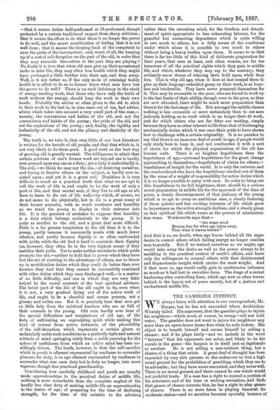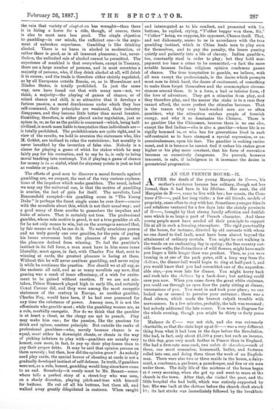THE GAMBLING INSTINCT.
WE always listen with attention to our correspondent, Mr. Harper, but he has not succeeded where Archbishop Wliately failed. His argument, that the gambler plays to injure his neighbour—which must, of course, be wrong—will not hold water. The gambler does not want to injure his neighbour any more than an opera-house lessee does when he sells tickets. His object is to benefit himself and amuse himself by selling a chance; and if he plays fairly—and we include in the word " fairness " that his opponents are sober, and likely to be his equals in the game—the bargain is in itself just as legitimate as another. He is not selling a non-existent thing, but a chance of a thing that exists. A great deal of thought has been expended by very able persons in the endeavour to find a high moral ground for the prohibition of gambling, which they see to be advisable; but they have never succeeded, and they never will. There is no moral ground, and there cannot be one which would not prohibit trade. If a man has a right to expend a portion of his substance and of his time in seeking recreation, and finds that games of chance recreate him, he has a right to play games of chance. There is no more harm in playing baccarat for moderate stakes—and we mention baccarat specially because of
the ruin that variety of vingt-et-un has wrought.—than there is in hiring a horse for a ride, though, of course, there is also to most men less good. The single objection to gambling—in our minds, the sufficient one—is the argu- ment of unbroken experience. Gambling is like drinking alcohoL There is no harm in alcohol in moderation, or rather there is good, as in all innocent pleasures ; but, never- theless, the unlimited sale of alcohol cannot be permitted. The experience of mankind is that everywhere, except in Tuscany, there are a large number of persons, and in most countries a majority of persons, who, if they drink alcohol at all, will drink it to excess; and the trade is therefore either strictly regulated, as by all Europeans outside Russia, or, as in Musaulman and Hindeo States, is totally prohibited. In just the same way, men have found out that with many men—not, we think, a majority—the playing of games of chance, or of mixed chance and skill, is so attractive that it develops a furious passion, a moral drunkenness under which they lose self-command, their principles are weakened, their industry disappears, and they become little better than moral lunatics. Gambling, therefore, is either placed under regulation, just as opium is, or, as far as the public is concerned—which, being half- civilised, is much more liable totemptation than individuals are— is totally prohibited. The prohibitionists are quite right, and in view of the results, we bold in aversion the statesmen who, like M. Goblet, are inclined to relax the restrictions; but morality is never benefited by the invention of false sins. Nobody is a sinner for playing a game of whist for stakes which he may fairly pay for his recreation, and to say he is, is only to bring moral teaching into contempt. Yet if playing a game of chance for money is in se sinful, whist for sixpenny points is just as bad as roulette or poker.
The efforts of good men to discover a moral formula against gambling are, we suspect, the root of the very curious explana- tions of the impulses which make gamblers. The usual, indeed we may say the universal one, is that the motive of gambling is avarice, the lust of gain for itself. The novelists, Lord Beaconsfield excepted—his gambling scene in "The Young Duke" is perhaps the finest single scene he ever drew—concur with the moralists about this, which is not their usual way; and a goal many of them ascribe to gamesters the impulses and looks of misers. That is certainly not true. The professional gambler, whose sole motive is greed, is not a true gambler at all, for he not only means to win, but on the average is assured that, by fair means or foul, he can do it. No really avaricious person and no truly greedy one ever gambles, for the pain of paying his losses overcomes both the pleasure of the game and the pleasure derived from winning. To feel the gambler's instinct in its full force, a man must have in him some inner liberality, must agree, in fact, with Charles Fox that, next to winning at cards, the greatest pleasure is losing at them. Without this he will never continue gambling, and never enjoy it while he continues the practice. Nor should we at all say, as the ancients all said, and as so many novelists say now, that gaming was a mark of inner effeminacy, of a wish for excite- ment to be gained without exertion. If we are not mis- taken, Prince Bismarck played high in early life, and certainly Count Cavour did, and they were among the most energetic statesmen of the century in Europe, as another gambler, Charles Fox, would have been, if he had ever possessed for any time the substance of power. Among men, it is not the effeminate who gamble most ; while the gambling women are, as a rule, morbidly energetic. Nor do we think that the gambler is at heart a cheat, as the clergy are apt to preach. Play may make him one ; for the passion, like the passions for drink and opium, masters principle. But outside the ranks of professional gamblers—who, merely because chance is so equal, must either be downright cheats, or cheats in the way of picking inferiors to play with—gamblers are usually very honest, care more, in fact, to pay up their play-losses than to pay their proper debts. It may be said that opinion presses on them severely ; but then, how did the opinion grow P As nobody need play cards, the special horror of cheating at cards is not a gradually developed instinct of self-defence. In truth, if gamblers were not, as a rule, honest, gambling would long since have come to an end. Somebody—it surely must be Mr. Besant—some- where tells a perfect story of a street-boy who was seen, on a shady doorstep, playing pitch-and-toss with himself for buttons. He cut off all his buttone, lost them all, and walked away greatly dilapidated in costume. When caught and interrogated as to his conduct, and presented with his buttons, he replied, crying, "T'other beggar won them, Sir," " t'other " being, we suppose, his opponent, Chance itself. That, and not dishonesty, seems to us in accordance with the true gambling instinct, which in China leads men to play even for themselves, and to pay the penalty, the losers passing quietly and patiently into a life of slavery. Indian gamblers, too, constantly steal in order to play ; but they hold non- payment too base a crime to be committed,—a fact the more notable because Indian religious opinion condemns games of chance. The true temptation to gamble, we believe, with all men except the professionals, is the desire which prompts most men to drink hard, the desire of excitement, of something to make them forget themselves and the commonplace circum- stances around them. It is a form, a bad or inferior form, cf the love of adventure. They get a stimulus from play, and they therefore play, and the nearer the stake is to a sum they. cannot afford, the more perfect the stimulus becomes. That is the reason why very hard.worked men are so often gamblers, why the attraction catches people of feverish energy, and why it so dominates the Chinese. There is no gambler like the Chinaman, because there is no one else, except the Red Indian—who is also a gambler—whose life is so rigidly hemmed in, or who has for generations lived in such self-restraint as to have stamped a special expression, or ex- pressionlessness, upon his face. The gambler is seeking excite.. ment, and it is because he cannot find it unless his stakes grow higher or his play more constant, that his form of recreation becomes no excessively dangerous. No pursuit, however innocent, is safe, if indulgence in it increases the desire in geometrical progression.



































 Previous page
Previous page